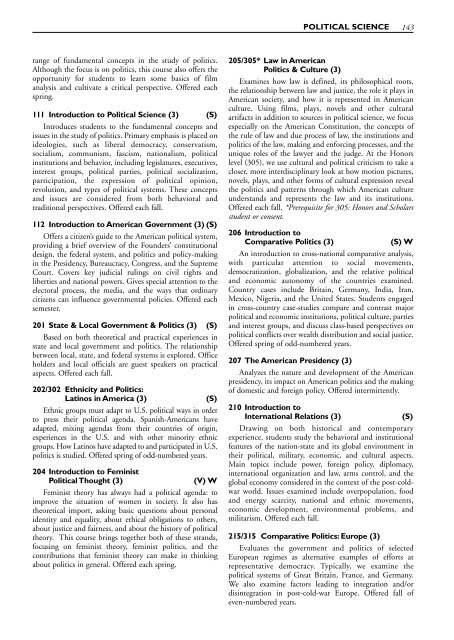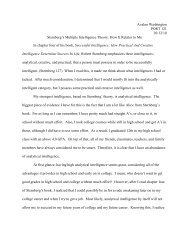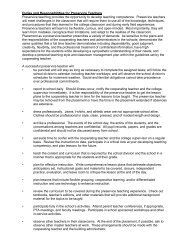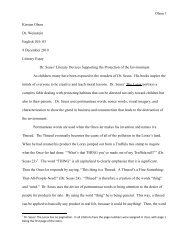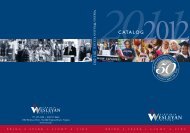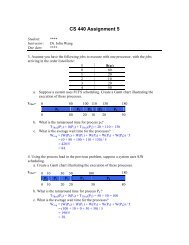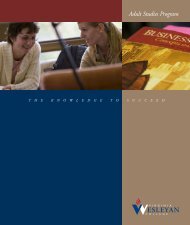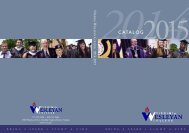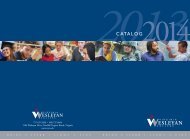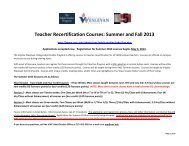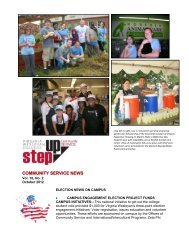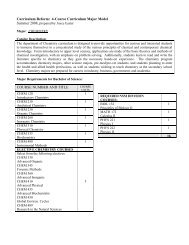2008-2009 Catalog - Virginia Wesleyan College
2008-2009 Catalog - Virginia Wesleyan College
2008-2009 Catalog - Virginia Wesleyan College
- No tags were found...
Create successful ePaper yourself
Turn your PDF publications into a flip-book with our unique Google optimized e-Paper software.
POLITICAL SCIENCE143range of fundamental concepts in the study of politics.Although the focus is on politics, this course also offers theopportunity for students to learn some basics of filmanalysis and cultivate a critical perspective. Offered eachspring.111 Introduction to Political Science (3) (S)Introduces students to the fundamental concepts andissues in the study of politics. Primary emphasis is placed onideologies, such as liberal democracy, conservatism,socialism, communism, fascism, nationalism, politicalinstitutions and behavior, including legislatures, executives,interest groups, political parties, political socialization,participation, the expression of political opinion,revolution, and types of political systems. These conceptsand issues are considered from both behavioral andtraditional perspectives. Offered each fall.112 Introduction to American Government (3) (S)Offers a citizen’s guide to the American political system,providing a brief overview of the Founders’ constitutionaldesign, the federal system, and politics and policy-makingin the Presidency, Bureaucracy, Congress, and the SupremeCourt. Covers key judicial rulings on civil rights andliberties and national powers. Gives special attention to theelectoral process, the media, and the ways that ordinarycitizens can influence governmental policies. Offered eachsemester.201 State & Local Government & Politics (3) (S)Based on both theoretical and practical experiences instate and local government and politics. The relationshipbetween local, state, and federal systems is explored. Officeholders and local officials are guest speakers on practicalaspects. Offered each fall.202/302 Ethnicity and Politics:Latinos in America (3)(S)Ethnic groups must adapt to U.S. political ways in orderto press their political agenda. Spanish-Americans haveadapted, mixing agendas from their countries of origin,experiences in the U.S. and with other minority ethnicgroups. How Latinos have adapted to and participated in U.S.politics is studied. Offered spring of odd-numbered years.204 Introduction to FeministPolitical Thought (3)(V) WFeminist theory has always had a political agenda: toimprove the situation of women in society. It also hastheoretical import, asking basic questions about personalidentity and equality, about ethical obligations to others,about justice and fairness, and about the history of politicaltheory. This course brings together both of these strands,focusing on feminist theory, feminist politics, and thecontributions that feminist theory can make in thinkingabout politics in general. Offered each spring.205/305* Law in AmericanPolitics & Culture (3)Examines how law is defined, its philosophical roots,the relationship between law and justice, the role it plays inAmerican society, and how it is represented in Americanculture. Using films, plays, novels and other culturalartifacts in addition to sources in political science, we focusespecially on the American Constitution, the concepts ofthe rule of law and due process of law, the institutions andpolitics of the law, making and enforcing processes, and theunique roles of the lawyer and the judge. At the Honorslevel (305), we use cultural and political criticism to take acloser, more interdisciplinary look at how motion pictures,novels, plays, and other forms of cultural expression revealthe politics and patterns through which American cultureunderstands and represents the law and its institutions.Offered each fall. *Prerequisite for 305: Honors and Scholarsstudent or consent.206 Introduction toComparative Politics (3)(S) WAn introduction to cross-national comparative analysis,with particular attention to social movements,democratization, globalization, and the relative politicaland economic autonomy of the countries examined.Country cases include Britain, Germany, India, Iran,Mexico, Nigeria, and the United States. Students engagedin cross-country case-studies compare and contrast majorpolitical and economic institutions, political culture, partiesand interest groups, and discuss class-based perspectives onpolitical conflicts over wealth distribution and social justice.Offered spring of odd-numbered years.207 The American Presidency (3)Analyzes the nature and development of the Americanpresidency, its impact on American politics and the makingof domestic and foreign policy. Offered intermittently.210 Introduction toInternational Relations (3)(S)Drawing on both historical and contemporaryexperience, students study the behavioral and institutionalfeatures of the nation-state and its global environment intheir political, military, economic, and cultural aspects.Main topics include power, foreign policy, diplomacy,international organization and law, arms control, and theglobal economy considered in the context of the post-coldwarworld. Issues examined include overpopulation, foodand energy scarcity, national and ethnic movements,economic development, environmental problems, andmilitarism. Offered each fall.215/315 Comparative Politics: Europe (3)Evaluates the government and politics of selectedEuropean regimes as alternative examples of efforts atrepresentative democracy. Typically, we examine thepolitical systems of Great Britain, France, and Germany.We also examine factors leading to integration and/ordisintegration in post-cold-war Europe. Offered fall ofeven-numbered years.


